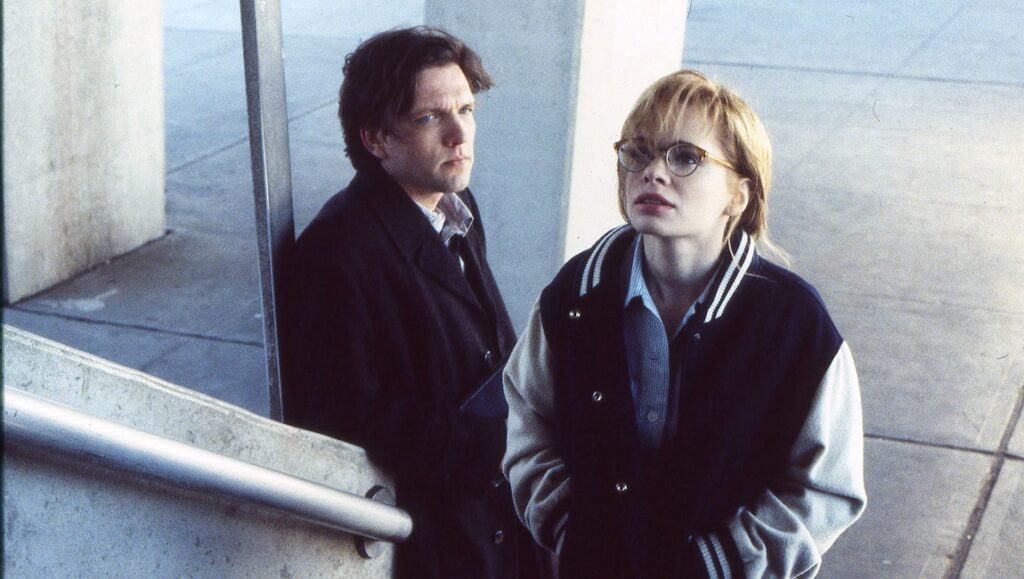Hal Hartley occupies a curious position in the American film scene. While he might reasonably be called an icon of the independent film scene and has remained a fixture of prestigious film festivals like Sundance and Cannes since the late 1980s, he has never had the true breakout success or mainstream recognition of someone like a Whit Stillman, let alone a Quentin Tarantino. True, his style and interests have shifted over the years, but aside from a few circles, Hartley’s visibility has waned considerably, to the point where he is rarely mentioned amid the independent heyday of the 1990s.
This is a shame, because in a just world, Trust would rightly be regarded as one of the most significant American films of the decade. It was Hartley’s second film after the prior year’s The Unbelievable Truth, and in essence the two form a loose diptych, centering on the yearnings and anxieties of characters played by Adrienne Shelly. In this case, Shelly plays Maria Coughlin, a 17-year-old high schooler who begins the film in rip-roaring fashion: she announces to her parents that she has dropped out of high school and that she is pregnant, then slaps her father, who drops dead of a heart attack. Her counterpart is Matthew Slaughter (Hartley stalwart Martin Donovan), an older man with a troubled past who lives with his abusive father, and in his first scene he quits his job fixing cheap electronics and puts his supervisor’s head in a vise.
The extremity of the described events help to begin the process of typifying what makes Hartley’s style so unique and invigorating; while Hartley’s first three films (including 1992’s Simple Men) belong to the so-called “Long Island Trilogy” and identifiably exist in that space, all cool tones and wide expanses of concrete, the actual world that Hartley illustrates is one as prone to bursts of surreal behavior and emotions as his 1991 short Ambition, wherein a walk to work is punctuated by three separate brawls, including with a woman holding a submachine gun. Crucially, these moments are received with the same heightened deadpan equanimity that characterizes almost all of Hartley’s interactions, ensuring that they blend into the texture of the film rather than jut out from it.
And just as crucially, the burgeoning romance that develops between Maria and Matthew is equally as strange, as thrilling in its development as these moments. The two don’t meet until almost half an hour into the film, and their first interaction is undertaken out of necessity: she has been kicked out of her house, and unlike the other men in the film, he takes pity on her and offers her a place to stay for the night. Hartley conceives of love as not necessarily an innate force that can conquer all, but as something born from desperation and loneliness, and which is subject to the very destabilizing and vindictive forces that first caused it to come into being. For Maria, it is her mother Jean (Merritt Nelson) and her now ex-boyfriend Anthony (Gary Sauer), and for Matthew, his father Jim (John MacKay) and the general state of Reaganite capitalism and its erosion of principles of quality and integrity. These factors are well in place by the time the two finally meet, so when they do, it registers with a great gravity, a relief that the rest of the film both challenges and ultimately upholds.
Trust is filled to the brim with subplots and obstacles — like Maria spending much of the film trying to find a frustrated housewife who stole a baby from a bus stop — which are ultimately less about the central romance and more about a certain way of being, an almost moral sense that Hartley infuses the film with. His philosophical discussions, like the one that gives the film its title — Maria sees love as being formed from respect, admiration, and trust, while Matthew is unable to let go of the material facts of their situation — are conveyed with a prosaic directness and flesh out what drives his characters down certain paths. This extends in large part to his supporting cast, who all are given a quirk of behavior, a shade of characterization that further deepens the concerns of the film, especially characters like Maria’s sister Peg (Edie Falco) and Karen Sillas as a weary abortion clinic nurse.
But at the end of the day, the film belongs to Donovan and especially Shelly, and their two acting styles mesh harmoniously with Hartley’s vision. Donovan, in his first of many performances for Hartley, leans into the inherent artificiality of the dialogue, delivering his lines with a brusque intelligence that projects a downbeat confidence in his convictions and hopes. By contrast, this would be Shelly’s last performance for Hartley in a tragically short life, and what begins as a bratty arrogance in the first third of the film stunningly metamorphoses into a certain tenderness, a considerateness that is informed by her maturation, her need to grow up in a world that tries to smother young women like her. Though Trust is one of the great American romances, in no small part because it is the story of two messed-up, lonely people who connect because there is no one else who can truly understand them, it is just as much an achingly observed, ultimately ebullient bildungsroman, an act of self-assertion that speaks so much to Hartley’s compassion and his ability to wring immense pathos from his signature, too-little-seen stylizations.
Part of Kicking the Canon – The Film Canon.


Comments are closed.